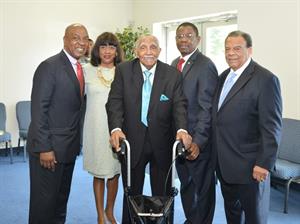Historic Moment: Civil Rights Icons Inspire at Claflin Commencement
May 16, 2014
 Claflin University’s 144th Commencement Convocation could not have been more historic with the largest class in University history, participation on the program by civil rights icons former Ambassador Andrew Young and Reverend Joseph Lowery, and prominent legal theorist Dr. Charles Ogletree serving as the speaker.
Claflin University’s 144th Commencement Convocation could not have been more historic with the largest class in University history, participation on the program by civil rights icons former Ambassador Andrew Young and Reverend Joseph Lowery, and prominent legal theorist Dr. Charles Ogletree serving as the speaker.
The significance of the day certainly was not lost on University President Dr. Henry N. Tisdale.
“This commencement will forever be etched into the memory of the graduates,” Tisdale said.
Rev. Lowery, affectionately known as the “dean of civil rights,” said the ceremony did not mark the end of a journey, but rather just the close of one phase in life.
“We fall down, but we get up,” he said. “There are going to be days when you may stumble, but I want you to think back to these days,” full of success and possibility.
Rev. Lowery, who delivered the benediction, had a special reason for attending the ceremony. A granddaughter, Maya Osborne, a sociology major from Smyrna, Ga., was among the graduates. Young shared the dais to give the invocation and had a grandson among the graduates, Kemet Alston, a mass communications major from Leakwood, Kan.
“It was a powerful moment,” Tisdale said. “These men represent a very important part of American history. Rev. Lowery and Rep. Young were on the front lines of civil rights and social justice in this country. And Dr. Ogletree is continuing to carry the torch.”
Lowery, a native of Huntsville, Ala., is credited with helping to launch a drive to end discrimination in Mobile, Ala. In 1957, he worked with Dr. Martin Luther King, Ralph David Abernathy and others to form the Southern Christian Leadership Conference, and became the group’s chairman in 1968. The 92-year-old is nicknamed the “dean of the civil rights movement” for his work as a minister and speaking out about civil rights, participating in protests and demonstrations, and helping to revitalize the SCLC to focus on such issues as police brutality and human rights in the African-American community.
Throughout his life, Lowery has been an unwavering champion of nonviolent resistance. He was a key figure in the desegregation of the United States and, after integration was achieved, focused his attention on other significant issues, such as black voter registration, affirmative action, AIDS education and workers’ rights.
He was selected by President Barack Obama to deliver the benediction at Obama’s inauguration in 2009. Lowery has received such accolades for his work as Ebony magazine's Black Achievement Award. Clark Atlanta University’s Joseph E. Lowery Institute for Justice and Human Rights was established in his honor.
The 82-year-old Young, a New Orleans native and ordained minister, worked alongside Dr. Martin Luther King Jr. in the SCLC. As the group’s executive director, he helped draw up the Civil Rights Act of 1964 and the Voting Rights Act of 1965. He was with King in Memphis, Tenn., the day he was assassinated in April 1968.
“If it were not for the Lord on our side, where would we be?” Young contemplated during his invocation at the ceremony. “Work your miracles through the members of this class,” he prayed.
Young became the first African-American to represent Georgia in Congress since Reconstruction when he was elected in 1972, was the first African-American ambassador to the United Nations and served as Atlanta’s mayor from 1982 to 1990. He was awarded the Presidential Medal of Freedom in 1981. Morehouse College named the Andrew Young Center for Global Leadership in his honor, and Young has taught at Georgia State University's Andrew Young School of Policy Studies.
Ogletree is a Harvard Law School Jesse Climenko Professor of Law and founding and executive director of Harvard’s Charles Hamilton Houston Institute for Race and Justice. The Institute is named in honor of the visionary lawyer who spearheaded the litigation in Brown v. Board of Education that focuses on a variety of issues relating to race and justice.
Citing the presence of Young and Lowery on the dais, Ogletree said, “We would not be here today were it not for the work that they did. We have to learn from our elders who have gone before us. They are the symbols of what you have to do. We have to make sure that we honor people like them.”
Ogletree is a prominent legal theorist who has earned an international reputation for taking a hard look at complex issues of law and working to secure the rights guaranteed by the Constitution for everyone equally under the law. He has penned a number of books on civil rights issues, and has served as faculty director, associate dean and vice dean of the Harvard Law School Clinical Program.
Success in life, he said, is made possible with the right support and foundation along the way.
“You don’t get there without help, without people lifting you up,” Ogletree said. “The Class of 2014 is forever grateful that someone saw in them success and ability.